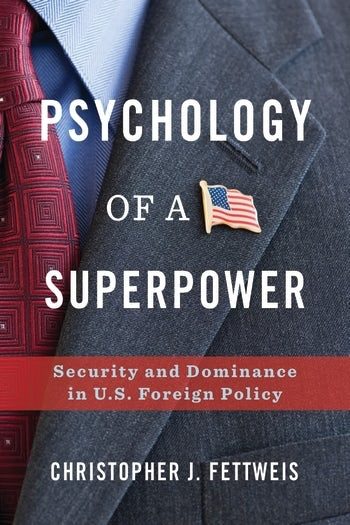 Psychology of a Superpower: Security and Dominance in U.S. Foreign Policy, Christopher J. Fettweis (New York: Columbia University Press, 2018), 280 pp., $90 cloth, $30 paper.
Psychology of a Superpower: Security and Dominance in U.S. Foreign Policy, Christopher J. Fettweis (New York: Columbia University Press, 2018), 280 pp., $90 cloth, $30 paper.
By many accounts, the world today is more peaceful and prosperous than ever before, and yet its most powerful country cannot seem to relax. In the United States, both among foreign policy elites and the broader public, the prevailing wisdom is that the world is more dangerous now than during the cold war. How to account for this mismatch? According to Christopher J. Fettweis, the United States could use a little time on the therapist’s couch. In Psychology of a Superpower: Security and Dominance in U.S. Foreign Policy, he applies lessons from psychology to analyze the impact that being the world’s sole superpower has had on the leaders of the United States and the foreign policies they have crafted since the end of the cold war.
Of primary concern to Fettweis is the U.S. obsession with maintaining such high levels of military spending in the face of what he views as a relatively nonthreatening unipolar world. In large part, he argues, this is the consequence of the misguided belief of most U.S. policymakers in some version of hegemonic stability theory, despite overwhelming empirical evidence that the United States not only does not truly exercise global hegemonic influence (which Fettweis is careful to distinguish from the empirical power aggregation of unipolarity) but also that it plays a relatively small role in keeping the “New Peace” of the post–Cold War era. To explain this disconnect, Fettweis identifies three common errors that keep leaders and policymakers rooted in this view: (1) people generally have an inflated sense of control over their lives, specifically with regard to positive outcomes; (2) they have an outsized view of how much they factor into the decisions of others; and (3) they consistently overestimate their our own benevolence and underappreciate that of their adversaries.
Over the course of the rest of the book, Fettweis analyzes U.S. nuclear policy, threat perception, and grand strategy through the lens of common cognitive biases. He argues that these biases are particularly potent when coupled to the incredible power of the United States. After all, such biases are held by all actors to some degree, but power does some strange and unique things to the brain: among other things, it can discourage empathy, increase our tendency to stereotype, and exacerbate the formation of an enemy image of our adversary. The result has been warped foreign policy prescriptions that consistently overestimate threats to the United States and that mistakenly treat means as ends.
Fettweis notes at the outset that one must be careful when applying lessons of psychology to political science since the two disciplines “have different goals, rules, epistemologies, and ontologies and sometimes differ over basic terms and concepts” (p. 77). Nonetheless, some skeptics may still be left wondering whether he has fully heeded his own advice. Whatever the reader may conclude, at a time when the U.S. role in the world is in flux, Psychology of a Superpower provides rich insights into the perils and pitfalls of decision-making under the influence of power.
More in this issue
Fall 2018 (32.3) • Essay
Backfire: The Dark Side of Nonviolent Resistance
In this essay, Michael L. Gross examines the ethics of provoking backfire in the context of nonviolent resistance.
Fall 2018 (32.3) • Essay
The Empire of International Legalism
In this essay, Ian Hurd uses the provocative term “empire” to show how the international legal system is also a political system based on the ...
Fall 2018 (32.3) • Essay
The Ethics of Countering Digital Propaganda
Corneliu Bjola argues in this essay that the concept of moral authority offers an original framework for responding to digital disinformation campaigns.